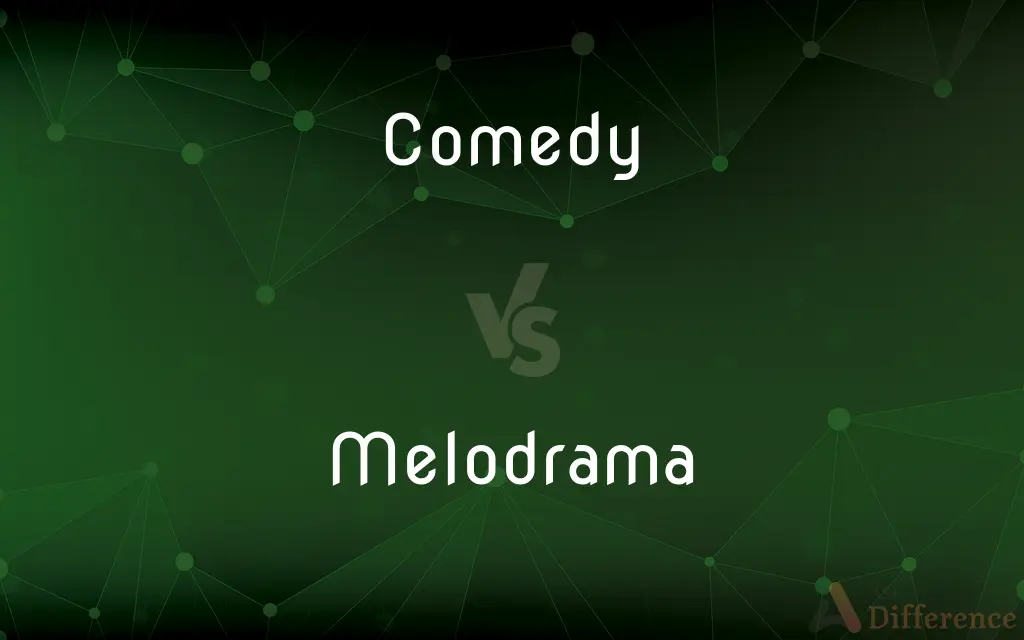Comedy vs. Melodrama — What's the Difference?
By Urooj Arif & Maham Liaqat — Updated on March 18, 2024
Comedy focuses on humor and entertainment, often with happy endings, while melodrama emphasizes exaggerated emotions and dramatic plots.

Difference Between Comedy and Melodrama
Table of Contents
ADVERTISEMENT
Key Differences
Comedy is a genre of film, theater, and literature that seeks to entertain and amuse the audience through humor, quirky characters, and often improbable situations. Its primary aim is to provoke laughter and provide a light-hearted reprieve from the daily grind. Melodrama, on the other hand, is characterized by its focus on sensational drama, exaggerated emotions, and the clear distinction between heroes and villains, often aiming to evoke a strong emotional response from the audience.
In comedy, the narrative is usually driven by misunderstandings, mistaken identities, and a series of comical events that lead to a resolution where most characters find happiness or redemption. The tone is generally upbeat, and even when touching upon serious themes, comedy maintains a light-hearted approach. Melodrama tends to involve more serious, often moralistic plots that include heightened emotional states, dramatic revelations, and a tendency towards moral polarities, where good ultimately triumphs over evil.
Comedies often utilize wit, satire, and slapstick humor to explore societal norms, human behavior, and the absurdities of everyday life. Characters in comedies are typically multi-dimensional and may grow or learn a lesson by the end of the story. In contrast, melodramatic characters are often archetypical, such as the virtuous protagonist, the wronged maiden, or the villainous antagonist, with their traits exaggerated to emphasize the moral of the story.
The setting and scenarios in comedies can range from the mundane to the fantastical but are always grounded in the intention to highlight the humor in situations. Melodramas, however, often feature gothic or romanticized settings, with plotlines revolving around personal dilemmas, family secrets, and intense emotional conflicts that are resolved in a cathartic climax.
Despite their differences, both comedy and melodrama play significant roles in storytelling and entertainment, offering audiences different means of escape, reflection, and emotional release. They can sometimes overlap in "dramedy" formats, where elements of both are used to enrich the narrative.
ADVERTISEMENT
Comparison Chart
Focus
Humor and entertainment
Exaggerated emotions and drama
Tone
Light-hearted, often with happy endings
Serious, with moralistic overtones
Characterization
Quirky, multi-dimensional characters
Archetypical, with clear heroes and villains
Plot Elements
Misunderstandings, comical events
Dramatic conflicts, moral dilemmas
Emotional Appeal
Provokes laughter
Aims to evoke strong emotional responses
Compare with Definitions
Comedy
Seeks to amuse with humor and quirky situations.
The comedy film turned the misunderstanding into a hilarious adventure.
Melodrama
Characterized by sensational plotlines and heightened emotions.
The melodrama portrayed the hero's struggle against a villainous tycoon.
Comedy
Characters often find themselves in improbable scenarios.
The protagonist in the comedy accidentally swapped bags with a spy.
Melodrama
Features clearly defined heroes and villains.
In the melodrama, the virtuous heroine faced off against the scheming villain.
Comedy
Typically concludes with a positive or happy ending.
The comedy wrapped up with the characters reconciling in a humorous twist.
Melodrama
Often resolves in a cathartic climax, reinforcing moral values.
The melodrama concluded with the triumph of good over evil in an emotional finale.
Comedy
Utilizes satire and slapstick to comment on societal norms.
The comedy skewered modern office life with its witty dialogue.
Melodrama
Emphasizes dramatic, often moralistic conflicts.
The melodrama focused on the protagonist's moral dilemma over family loyalty.
Comedy
Maintains a light-hearted tone even when addressing serious themes.
Despite its take on unemployment, the comedy kept audiences laughing.
Melodrama
Uses exaggerated characters to evoke emotional responses.
The melodrama's tragic hero moved audiences to tears with his plight.
Comedy
Comedy (from the Greek: κωμῳδία, kōmōdía) is a genre of fiction comprised of discourses or works intended to be humorous or amusing by inducing laughter, especially in theatre, film, stand-up comedy, television, radio, books, or any other entertainment medium. The term originated in Ancient Greece: in Athenian democracy, the public opinion of voters was influenced by political satire performed by comic poets in theaters.
Melodrama
In modern usage, a melodrama is a dramatic work wherein the plot, which is typically sensational and designed to appeal strongly to the emotions, takes precedence over detailed characterization. Melodramas typically concentrate on dialogue, which is often bombastic or excessively sentimental, rather than action.
Comedy
Professional entertainment consisting of jokes and sketches, intended to make an audience laugh
The show combines theatre with the best of stand-up comedy
A cabaret with music, dancing, and comedy
Melodrama
A drama, such as a play, film, or television program, characterized by exaggerated emotions, stereotypical characters, and interpersonal conflicts.
Comedy
A play characterized by its humorous or satirical tone and its depiction of amusing people or incidents, in which the characters ultimately triumph over adversity
Shakespeare's comedies
Melodrama
The dramatic genre characterized by this treatment.
Comedy
A dramatic work that is light and often humorous or satirical in tone and that usually contains a happy resolution of the thematic conflict.
Melodrama
Behavior or occurrences having melodramatic characteristics.
Comedy
The genre made up of such works.
Melodrama
A kind of drama having a musical accompaniment to intensify the effect of certain scenes.
Comedy
A literary or cinematic work of a comic nature or that uses the themes or methods of comedy.
Melodrama
(countable) A drama abounding in romantic sentiment and agonizing situations, with a musical accompaniment only in parts which are especially thrilling or pathetic. In opera, a passage in which the orchestra plays a somewhat descriptive accompaniment, while the actor speaks
The melodrama in the grave digging scene of Beethoven's "Fidelio".
Comedy
Popular entertainment composed of jokes, satire, or humorous performance.
Melodrama
Any situation or action which is blown out of proportion.
Comedy
The art of composing or performing comedy.
Melodrama
Formerly, a kind of drama having a musical accompaniment to intensify the effect of certain scenes. Now, a drama abounding in romantic sentiment and agonizing situations, with a musical accompaniment only in parts which are especially thrilling or pathetic. In opera, a passage in which the orchestra plays a somewhat descriptive accompaniment, while the actor speaks; as, the melodrama in the gravedigging scene of Beethoven's "Fidelio".
Comedy
A humorous element of life or literature
The human comedy of political campaigns.
Melodrama
An extravagant comedy in which action is more salient than characterization
Comedy
A humorous occurrence.
Comedy
A choric song of celebration or revel, especially in Ancient Greece.
Comedy
(countable) A light, amusing play with a happy ending.
Comedy
A narrative poem with an agreeable ending (e.g., The Divine Comedy).
Comedy
A dramatic work that is light and humorous or satirical in tone.
Comedy
(drama) The genre of such works.
Comedy
(uncountable) Entertainment composed of jokes, satire, or humorous performance.
Why would you be watching comedy when there are kids starving right now?
Comedy
The art of composing comedy.
Comedy
(countable) A humorous event.
Comedy
A dramatic composition, or representation of a bright and amusing character, based upon the foibles of individuals, the manners of society, or the ludicrous events or accidents of life; a play in which mirth predominates and the termination of the plot is happy; - opposed to tragedy.
With all the vivacity of comedy.
Are come to play a pleasant comedy.
Comedy
Light and humorous drama with a happy ending
Comedy
A comic incident or series of incidents
Common Curiosities
What makes a character in a melodrama different from one in a comedy?
Characters in melodramas are often archetypical with exaggerated traits to highlight moral distinctions, while those in comedies are usually more nuanced and multi-dimensional, often with a focus on growth or change.
Can a story be both a comedy and a melodrama?
While they have distinct characteristics, some stories, known as "dramedies," blend elements of both comedy and melodrama to create a rich, nuanced narrative.
Why do comedies often include serious themes?
Comedies may incorporate serious themes to offer commentary or insight on societal issues, using humor as a tool to explore and critique.
Are the endings of melodramas always predictable?
While melodramas often conclude with clear resolutions reinforcing moral values, they can sometimes surprise the audience with twists or nuanced endings that add depth to the narrative.
Can melodramas be based on true stories?
Yes, many melodramas are inspired by real-life events or stories, with the details heightened or dramatized to emphasize emotional impact and moral lessons.
What is the main goal of comedy in storytelling?
The main goal of comedy is to entertain and amuse the audience, often providing a humorous perspective on life's challenges.
Are there any cultural variations in how comedies and melodramas are presented?
Yes, cultural differences can significantly influence the themes, humor styles, character archetypes, and storytelling techniques used in comedies and melodramas, reflecting societal norms and values.
How do modern interpretations of comedies and melodramas differ from their classical forms?
Modern interpretations might blend genres, incorporate diverse perspectives, and utilize contemporary themes and humor, reflecting current societal issues and sensibilities, while classical forms often adhered more strictly to genre conventions.
How do melodramas engage the audience?
Melodramas engage the audience by drawing them into a world of heightened emotions and dramatic conflicts, often leading to an empathetic emotional response.
How does the setting in comedies and melodramas contribute to the story?
In comedies, the setting often serves as a backdrop for humorous situations, while in melodramas, it can enhance the dramatic tone, often reflecting the emotional states or conflicts of the characters.
Do comedies have to involve slapstick humor?
Not necessarily. Comedies can employ a wide range of humor styles, from slapstick and physical comedy to wit, satire, and even dark humor, depending on the intended audience and thematic focus.
What challenges do writers and directors face when creating comedies and melodramas?
They must balance entertainment with believability, ensuring that the humor or drama resonates with audiences without overstepping into incredulity or insensitivity, especially when dealing with complex themes.
What role does music play in comedies and melodramas?
Music in comedies often enhances the humor and pacing, while in melodramas, it can intensify emotions, underscore dramatic moments, and contribute to the overall mood.
How do comedies and melodramas influence popular culture?
Both genres significantly impact popular culture by shaping societal attitudes, sparking conversations, and providing a mirror to the human condition, often leaving lasting impressions through memorable characters and narratives.
How do audiences typically react to comedies versus melodramas?
Audiences usually react to comedies with laughter and amusement, finding a sense of joy and entertainment, while melodramas often elicit stronger emotional responses, such as tension, sympathy, or catharsis.
Share Your Discovery

Previous Comparison
Production vs. Productivity
Next Comparison
Pudding vs. DessertAuthor Spotlight
Written by
Urooj ArifUrooj is a skilled content writer at Ask Difference, known for her exceptional ability to simplify complex topics into engaging and informative content. With a passion for research and a flair for clear, concise writing, she consistently delivers articles that resonate with our diverse audience.
Co-written by
Maham Liaqat













































